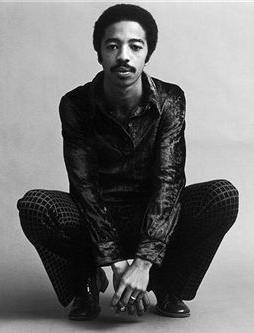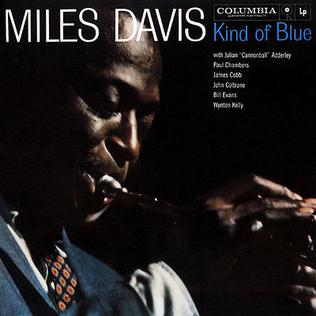Related Research Articles

Miles Dewey Davis III was an American jazz musician, trumpeter, bandleader, and composer. He is among the most influential and acclaimed figures in the history of jazz and 20th-century music. Davis adopted a variety of musical directions in a five-decade career that kept him at the forefront of many major stylistic developments in jazz.

Anthony Tillmon Williams was an American jazz drummer. Williams first gained fame as a member of Miles Davis' "Second Great Quintet", and later pioneered jazz fusion with Davis' group and his own combo, the Tony Williams Lifetime. In 1970, music critic Robert Christgau described him as "probably the best drummer in the world". Williams was inducted into the Modern Drummer Hall of Fame in 1986.

Kind of Blue is the thirty-third studio album by American jazz musician, trumpeter, composer, and bandleader Miles Davis. It was recorded on March 2 and April 22, 1959, at Columbia's 30th Street Studio in New York City, and released on August 17 of that same year by Columbia Records. For the recording, Davis led a sextet featuring saxophonists John Coltrane and Julian "Cannonball" Adderley, pianist Bill Evans, bassist Paul Chambers, and drummer Jimmy Cobb, with new band pianist Wynton Kelly appearing on one track – "Freddie Freeloader" – in place of Evans.

Eddie Harris was an American jazz musician, best known for playing tenor saxophone and for introducing the electrically amplified saxophone. He was also fluent on the electric piano and organ. His best-known compositions are "Freedom Jazz Dance", popularized by Miles Davis in 1966, and "Listen Here".
Coltrane changes are a harmonic progression variation using substitute chords over common jazz chord progressions. These substitution patterns were first demonstrated by jazz musician John Coltrane on the albums Bags & Trane and Cannonball Adderley Quintet in Chicago. Coltrane continued his explorations on the 1960 album Giant Steps and expanded on the substitution cycle in his compositions "Giant Steps" and "Countdown", the latter of which is a reharmonized version of Eddie Vinson's "Tune Up". The Coltrane changes are a standard advanced harmonic substitution used in jazz improvisation.

Seven Steps to Heaven is the eighth studio album on Columbia Records by jazz musician Miles Davis, released in 1963, catalogue CL 2051 and CS 8851 in stereo. Recorded at Columbia's 30th Street Studios in Manhattan, and at Columbia Studios in Los Angeles, in sessions recorded in April of 1963, and May of 1963. It presents the Miles Davis Quintet in transition, with the New York session introducing the rhythm section of Herbie Hancock, Ron Carter and Tony Williams, who would become Davis' regular sidemen for the next five years. Upon release, the album was Davis' most successful on the Billboard pop LPs chart up to that point, peaking at number 62.

George Edward Coleman is an American jazz saxophonist known for his work with Miles Davis and Herbie Hancock in the 1960s. In 2015, he was named an NEA Jazz Master.

Victor Stanley Feldman was an English jazz musician who played mainly piano, vibraphone, and percussion. He began performing professionally during childhood, eventually earning acclaim in the UK jazz scene as an adult. Feldman emigrated to the United States in the mid-1950s, where he continued working in jazz and also as a session musician with a variety of pop and rock performers.
Wilton Jameson "Jamey" Aebersold is an American publisher, educator, and jazz saxophonist. His Play-A-Long series of instructional books and CDs, using the chord-scale system, the first of which was released in 1967, are an internationally renowned resource for jazz education. His summer workshops have educated students of all ages since the 1960s.
"Naima" is a jazz ballad composed by John Coltrane in 1959 that he named after his then-wife, Juanita Naima Grubbs. Coltrane first recorded it for his 1959 album Giant Steps, and it became one of his first well-known works.
Anthony John Kronenberg, known professionally as Tony Crombie, was an English jazz drummer, pianist, bandleader, and composer. He was regarded as one of the finest English jazz drummers and bandleaders, an occasional but capable pianist and vibraphonist, and an energizing influence on the British jazz scene over six decades.

Steve Khan is an American jazz guitarist.

Seven Steps: The Complete Columbia Recordings of Miles Davis 1963–1964 is a box set of studio and concert recordings by Miles Davis for Columbia over a two-year period. Instead of focusing on a particular collaboration or session period, it focuses on the time period in between the solidified lineups of the first and second Great Quintets, starting with Ron Carter's introduction and finishing with the establishment of Wayne Shorter in the lineup.

Quiet Nights is a studio album by jazz musician Miles Davis, and his fourth album collaboration with Gil Evans, released in 1963 on Columbia Records, catalogue CL 2106 and CS 8906 in stereo. Recorded mostly at Columbia's 30th Street Studios in Manhattan, it is the final album by Davis and Evans.

Miles Davis' Greatest Hits is a compilation album by Miles Davis originally released in 1969 and re-released in 1997 on CD with different recordings of tracks 3, 4 and 8.

Directions is a compilation album by American jazz musician Miles Davis, released in 1981 by Columbia Records. It collects previously unreleased outtakes that Davis recorded between 1960 and 1970. Directions was the last of a series of compilation albums - mostly consisting of, at that time, previously unreleased music - that Columbia released to bridge Davis' recording hiatus that ended with The Man with the Horn in July 1981.
"Joshua" is a 1963 jazz standard composed by the British jazz multi-instrumentalist Victor Feldman and the jazz trumpeter Miles Davis. It was introduced in 1963 by the Miles Davis Quintet.
"Four" is a 1954 jazz standard. It was first recorded and arranged in 1954 by jazz trumpeter Miles Davis and released on his album Miles Davis Quartet. It is a 32-bar ABAC form.
"Good Bait" is a jazz composition written by American jazz piano player and composer Tadd Dameron and by band leader Count Basie. It was introduced in 1944 and was popular in the 1940s and 1950s.
"Pensativa" is a bossa nova jazz standard by American pianist/composer/arranger Clare Fischer, first recorded in 1962 by a quintet under the joint leadership of Fischer and saxophonist Bud Shank, and released that year as part of an album entitled Bossa Nova Jazz Samba, comprising music in this style, as per its title, all of it arranged by Fischer, and, with the exception of Erroll Garner's "Misty", composed by him as well. In retrospect, this would prove to be just the first of countless forays by Fischer into various areas of Latin music. This particular song was one of the first, and almost certainly the most famous, of all the foreign-born - i.e. non-Brazilian - bossa novas. Its form, though extended (64 mm.), is standard A-A-B-A, with each section consisting of 16 measures instead of eight.
References
- 1 2 3 Aebersold, Jamey (1995). Jamey Aebersold Play-A-Long - Volume 50 - The Magic of Miles. Jamey Aebersold Jazz Inc. pp. ii. ISBN 1-56224-209-1.
- ↑ The two Los Angeles (i.e. the first ever recorded) versions of “Seven Steps to Heaven” appear on the CD-box set Seven Steps: The Complete Columbia Recordings of Miles Davis 1963-1964 (Columbia, 2004).
- ↑ Chambers, Jack. Milestones 2: The Music and Times of Miles Davis Since 1960, Da Capo Press, 1998. pp. 53ff.
- ↑ Levine, Mark (1995). The Jazz theory Book . Sher Music Co. pp. 393. ISBN 9781883217044.